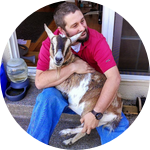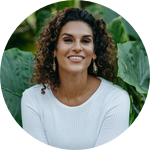About This Project
Trinidad and Tobago is home to many species of skates and rays but exactly how many and their locations are still unknown. There is a lack of knowledge on skate and ray biodiversity, life-history and ecology, however at least a third are thought to be on the IUCN Red List of Threatened Species. They are commonly caught as bycatch, and increasingly being kept for commercial sale. It is important to close these gaps in support of conservation and management.
Ask the Scientists
Join The DiscussionWhat is the context of this research?
Many species of skates and rays are globally threatened, with this group disproportionately threatened in tropical coastal waters. Historical and anecdotal information shows Trinidad and Tobago is home to many species of skates and rays, including many on the IUCN Red List of Threatened Species, but exactly how many and where they occur are still unknown. Working with fishers in Trinidad and Tobago, Farahnaz observed many skates and rays being caught as bycatch, with increasing amounts retained for sale. Fishers also exhibited a lack of knowledge on common or scientific names, with all being referred to as "stingray". The absence of this basic knowledge hampers data collection and monitoring for this important group.
What is the significance of this project?
We don't know for certain how many and which skate and ray species live in our waters and what their ecology is like. Trinidad & Tobago is in a geographic area with very intense and unregulated fisheries, which has resulted in population declines and/or the suspected disappearance of several rays. The nearshore habitats favoured by skates and rays in the region makes the Gulf of Paria, on Trinidad's west coast, one of the more suitable habitats locally, but again is subject to unregulated fisheries. The lack of local knowledge of skates and rays hinders appreciation for this misunderstood group and hampers scientific research and stewardship. This project will be the first of its kind in Trinidad and Tobago and will provide critical information for management.
What are the goals of the project?
This project aims to uncover the diversity and location of skates and rays in Trinidad and Tobago's waters using fishers' local knowledge, species occurrence records, and the identification of species caught incidentally in the commercial and recreational fisheries. Given the increasing trend of bycatch retention for commercial sale, fishers’ knowledge, attitude and perceptions regarding skates and rays will be assessed. A waterproof field guide will be developed to build capacity among resource users to monitor and document the occurrence of skates and rays. Skates and rays present in Trinidad and Tobago's waters, as well as their threats and conservation statuses will be highlighted through traditional and social media.
Budget
In Trinidad and Tobago, skates and rays are caught as bycatch by several fleets using different gears, with landing done at >90 sites around the two islands. This project has already had 5000USD support pledged from another source, however the funds raised through experiment.com will be essential for conducting surveys with fishers at a subset of these landing sites. These surveys will not only determine the diversity of rays caught by location and gear type, but also the fishers' knowledge, attitudes and practices regarding skates and rays and their conservation. The diversity data gathered will be used to develop a waterproof ID guide that will serve as a valuable asset for facilitating monitoring and data collection by all stakeholders within and beyond this project. popular and social media will be used to captivate local stakeholders and raise awareness of this important group.
Endorsed by
 Project Timeline
Project Timeline
This project is estimated to take one year. Online and face-to-face surveys with fishers and dive tour operators, field observations of fishing activities, and the compilation of photographic records will be done in the first six months. Data analysis, the design and printing of an identification guide, and report writing will be conducted in months 7 to 12. Project updates and key findings will be be shared via traditional and social media, as well as here on experiment.com.
Apr 18, 2023
Project Launched
Jul 01, 2023
Project start
Aug 01, 2023
First newspaper article complete
Aug 31, 2023
Completion of questionnaire design and testing, determination of sampling strategy, and field-work planning
Nov 01, 2023
Second newspaper article complete
Meet the Team
Diva Amon
Dr. Diva Amon is a Caribbean marine biologist focused on the little-known habitats and animals of the deep ocean,and how our actions are impacting them. She works at the nexus of science, policy and communication and has a deep desire to see stewardship measures applied to the ocean as well as the engagement of a broader group of global stakeholders towards this effort. Diva has participated in research cruises around the world and has been featured on global outlets, including Disney+, National Geographic, BBC, and CNN International. Amon is a founder and director of SpeSeas, an organization dedicated to marine science, education, and advocacy in her home country, Trinidad and Tobago, and a science advisor to the Benioff Ocean Science Laboratory at the University of California, Santa Barbara.
Farahnaz Solomon
Dr. Farahnaz Solomon is a marine biologist with significant experience in fish biology and fisheries. She has over 15 years professional experience implementing projects in coastal resource conservation and management, both in Trinidad and Tobago. She has considerable experience working with community stakeholders, especially fishers and fishing communities, and has been involved in public education and awareness to a wide spectrum of stakeholders including school children, community groups and resource users.
Lab Notes
Nothing posted yet.
Project Backers
- 7Backers
- 108%Funded
- $5,651Total Donations
- $807.29Average Donation



